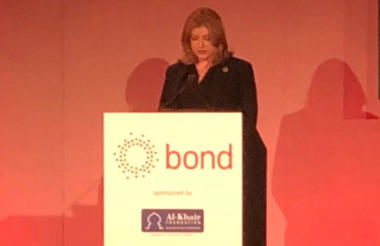International development secretary Penny Mordaunt yesterday promised more support for small charities working towards the Sustainable Development Goals.
And she announced that the Department for International Development (DfID) expected organisations from all sectors to work in partnership to boost the impact that the UK could have on meeting the global goals.
In a speech to the Bond Conference in London, Mordaunt pointed out that in the 12 months since the safeguarding scandals broke, the international aid sector had mobilised swiftly to drive up standards and a lot had been achieved.
“The initiatives you designed with law enforcement agencies are having an effect,” she said. “Interpol are now working to stop perpetrators moving around the aid sector. A humanitarian worker register is being set up. Capacity in other nations, who had not digitised criminal records, is being strengthened, and our own National Crime Agency now has an aid lead.
“And we know of at least 91 staff who you fired out of the sector last year linked to sexual exploitation and abuse and harassment cases.”
But she reminded the sector of the huge challenges the world faces: “261 million children still out of school; 200 million disabled people living below the poverty line; more than half the world’s population lacking access to essential health services - and by 2050, we going to need nearly three planets to cope with our current lifestyles.”
She said the UK will need to bring all its resources and expertise to bear if it is to tackle these challenges and meet the Sustainable Development Goals (SDGs) by 2030. Public, private and charity sector organisations will all need to "unite behind one mission", she said. As part of a new “Great Partnerships initiative”, DfID will use its convening power to ignite and support more cross-sector partnerships, and Mordaunt said she is writing to hundreds of British organisations “inviting them into DfID to be part of that team”.
This will include small charities, she said.
“A larger share of my budget in future will go to those small charities who do so much with small sums. And a major part of that is humanitarian organisations.
“We have already piloted a small charities fund and this summer we will be launching an improved fund in full. It will be nimbler, easier to apply to, open, and have a rolling application process.” She also said the £50,000 cap, in place since the £4m Small Charities Challenge Fund launched in July 2017, will be removed.
She added that the government would provide £3m through the H2H (Humanitarian2Humanitarian) network to help small organisations responding to global disasters with services such as mapping and translation.
DfID is also making internal changes, she said, shortening funding timescales and ensuring it pays full costs.
0.7 per cent aid commitment
In response to questions afterwards, she said the sector needed to “chill out and calm down” about suggestions that DfID would be subsumed into the Foreign & Commonwealth Office, and that the UK’s 0.7 aid budget commitment would be reduced.
“There are no plans for DfID to be hoovered up by another department or turned into something else,” she said. “And, we ought to be talking more about what you and all these organisations are achieving, which is incredible, and less about the 0.7 per cent. I think we should just move on from that,” she said.
Climate change
She was also asked about climate change and whether DfID would stop spending on fossil fuels including oil and gas, but she could not give that assurance.
“We don’t have a blanket ban but we don’t provide bilateral assistance for coal-fired power generation and would only consider that in very rare circumstances in multilateral development banks. We do think there is a role for some of that though, where there isn’t a viable alternative.”
However, she said the government is having a “renewed focus” on climate change and that “in the coming weeks and months you will be hearing a lot more about how we’re going to be picking up on this agenda”.
The prime minister has just been given the role of the UN Secretary General’s climate resilience champion, she said, and is already working with other nations on that.
“Climate is a massive focus for us now, this year in particular,” Mordaunt said.
Tighter regulation of financial services
She also hinted that the forthcoming spending review would include details of how the UK plans to drive up transparency and standards in the City of London following the exposure of recent scandals such as £2m in secret loans being funnelled from London banks to Mozambique.
In response to a question about whether the UK needs new laws to ensure that loans to governments from UK-based companies are publicly disclosed, she said: “If we are the financial centre of the world, we have to be driving this agenda.
“Transparency is absolutely key to this. This is one of the things DfID brings to the debate within government, and we’ll be doing more of this in future. I don’t wish to overrule the Treasury but we have ambitions as we go into the spending review about what we’ll be doing on this agenda.
“It is the entire margin of victory,” she said. “There’s no point in aid and good lending if that is dwarfed by what leaves in illicit money flows and getting nations into debt. We need complete transparency on that front.”
|
Related articles











